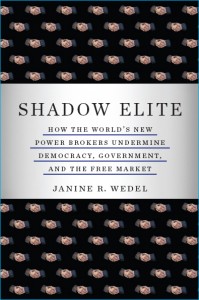Who are “shadow elites?”
Today’s top power brokers, shadow elites debuted with the privatization of government, the diffusion of global authority, and new information technologies over the past several decades. Shadow elites move seamlessly across (often not-fully-revealed) roles in government, business, think tanks, and national borders in pursuit of their own agendas. Often, they work together in exclusive networks to serve their own goals. Their influence is scarcely conveyed by their titles. Shadow elites test both the state’s rules of accountability and the free market’s rules of competition. Shadow elites are less stable, less visible, more peripatetic, and more global in reach than their power-broker forebears.
No matter what arena(s) they operate in, the cachet of these new power brokers is in information: their access to and control of official (or should-be official) information, their ability to use information gleaned in one venue in other venues, their skill at getting their own versions of the truth branded as the most authoritative official version, and their ability to brand for the media and public both the information they have access to and their own activities to suit their own agendas. The problem for democratic society is that the public has no way of knowing these players’ true agendas. They are potentially more insidious and dangerous to democracy because the full range of their activities and their true agendas are more difficult to detect. Journalist and auditors – who have limited jurisdiction – are no match for shadow elites who are all over the map – literally.
Below is a description of the book Shadow Elite.
SHADOW ELITE:
How the World’s New Power Brokers Undermine Democracy,
Government, and the Free Market
(Basic Books, December 1, 2009)
Janine R. Wedel
Governments and administrations come and go, but not so a new breed of power brokers, who always seem to pop up just where the action is. Wearing different hats, they press their agendas in venue after venue. According to award-winning public policy scholar and anthropologist Janine Wedel, these are the “shadow elite,” the prime movers in a vexing new system of power and influence.
Wedel charts how these players make public decisions without public input—in realms from domestic to foreign and financial policy. Maneuvering through their many spheres of influence, they challenge both governments’ rules of accountability and businesses’ codes of competition, ultimately answering only to each other. From the Harvard economists who helped privatize post-Soviet Russia and the neoconservatives who helped privatize American foreign policy for thirty years (culminating with the debacle that is Iraq) to many lesser-known global operators, these players flout once-sacrosanct boundaries between state and private, bureaucracy and market. This new breed, unseen by most, is steadily gaining power.
Original and eye-opening, Shadow Elite gives us the tools we need to recognize these players and understand the new system—which we ignore at our peril.

